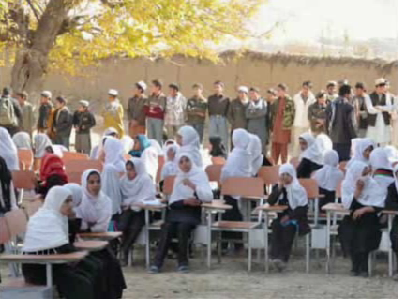Angelina Jolie Opens Girls School in Afghanistan | Jolie Visits Congo Women Ahead of G8 Meeting | Texas Title 10 $
/1. Angelina Jolie opens Afghanistan girls school. Angelina Jolie inspired me to start writing AOC and she is a muse in many ways to the development of our content and philosophy. Jolie’s latest project is a school for girls she opened in Afghanistan, funding it with profits from her new Style by Jolie jewelry collaboration with Robert Procop.
The girls-only primary school is located just outside of Kabul, in an area known for resistance to educating girls.
“The beauty of these creations is matched by the beauty of spirit behind Angelina’s most heartfelt mission — to empower children in crisis…For me it’s an honor to have the opportunity to be a part of creating this line with Angie, as we both believe every child has a right to an education.”
2. Angelina Jolie lends voice to DR Congo rape victims. On March 26, Angelina Jolie joined British Foreign Secretary William Hague in his efforts to raise commitments of G8 countries to tackle rape and sexual assault in war zones. Jolie and Hague are calling on the G8 to agree that rape and sexual violence constitute breaches of the Geneva Conventions governing warfare, as well as a new international protocol on the documentation and investigation of the issue.
“More often than not the international community looks away, the perpetrators of these brutal crimes walk free and the cycle of injustice and conflict is repeated. We have to shatter this culture of impunity,” Hague said.
3. Hamas seeks to educate girls separately from boys. Palestinian boys and girls in Gaza should be educated at separate schools if a new Hamas-proposed law takes effect. The new policy is more symbolic than functional, since most older children are already educated in single-sex schools. Of greater concern is that the law is another example of Hamas flexing its muscle on its insistence on a strict, traditional interpretation of Islam.
The UN announced last month that it would cancel its annual Gaza marathon after Hamas insisted that women no longer participate. London’s The Independent writes that to date Hamas has not been tough on enforcing restrictions on women.
4. Not so fast, Saudi ladies! Foreign Policy reports that Saudi Arabian women might not be riding bikes after all. On Monday reports were that an unnamed Saudi religious police official said that women will now be allowed to ride bicycles in the country for “entertainment” purposes only.
5. In France women will no longer have to pay to terminate a pregnancy and young women 15-18 will be allowed free and anonymous access to contraception. The French government seeks to reduce the number of abortions and teen pregnancies among poor women, reports NPR.
6. In a massive win for the poor women of Texas, the The Women’s Health and Family Planning Association of Texas (WHFPT), which includes Planned Parenthood, has received millions of dollars enabled by the federal government under Title X grants. No funds can be used for abortion, but it will allow women’s clinics to provide free contraception and other women’s health services to poor women.
The state of Texas has gone to inordinate pain to put Planned Parenthood out of business, sacrificing women’s health across the state. We’ve reported in depth that current estimates are that 24,000 unwanted children will be born in 2013 to poor women with no access to contraception.
7. Republican lawmakers in North Carolina are proposing the formation of a state religion. The bill would declare the state exempt from the Constitution and court rulings. The bill says each state “is soverign” and courts cannot block a state “from making laws respecting an establishment of religion.”
In Mississippi, writes Huff Po, the legislature is looking at a proposal to establish a state board with the power to nullify federal laws.
Constitutional law professor Jeffrey Fisher from Stanford University says “It is elementary that a state cannot pass a statute that blocks enforcement of an otherwise enforceable federal law.”
8. Women’s rights activists in North Dakota want to put all abortion rights legislation laws up for a popular vote. The referral process would involve obtaining petition signatures to start a statewide vote over whether or not the recent bans should be allowed to go into effect.


























































